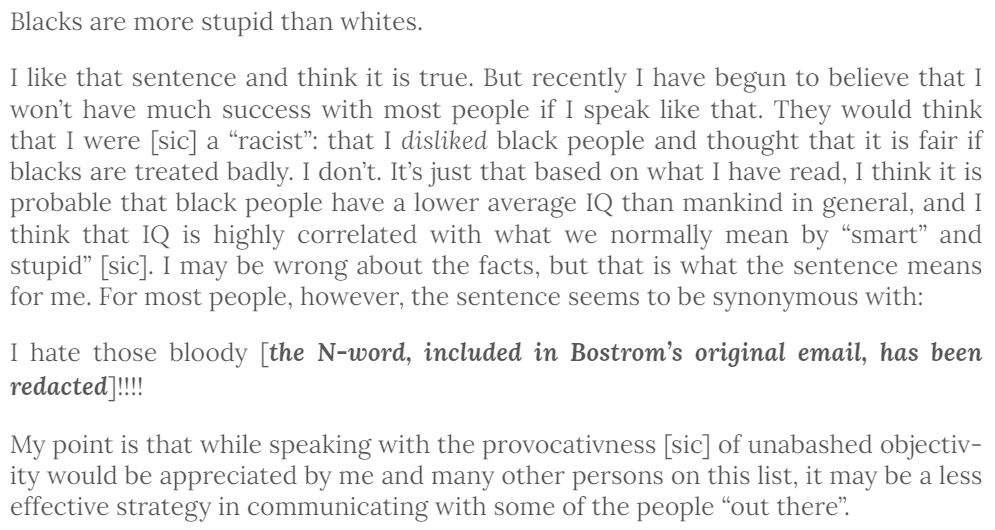
I’ve recently been seeing more and more about eugenics. Eugenics is a supposed scientific way to develop the perfect human, immune to disease and designed to live long and prosper (as Spock would say). A more formal definition comes from The National Human Genome Research Institute:
Eugenics is the scientifically erroneous and immoral theory of “racial improvement” and “planned breeding,” which gained popularity during the early 20th century. Eugenicists worldwide believed that they could perfect human beings and eliminate so-called social ills through genetics and heredity. They believed the use of methods such as involuntary sterilization, segregation and social exclusion would rid society of individuals deemed by them to be unfit.
Oh dear. Sounds a bit like Sweden in the 20th century as demonstrated by Swedish-born philosopher Nick Bostrom who created the Future of Humanity Institute (FHI) at Oxford University in 2005, although the movement was actually created by Sir Francis Galton, a cousin of Charles Darwin.
Why am I seeing more and more about this?
Because people like Mark Zuckerberg and Elon Musk seem to believe in it. For example, the FHI received £13.3 million from the Open Philanthropy Project, a non-profit organisation backed by Facebook co-founder Dustin Moskovitz and Elon Musk has also been a benefactor.
Why would Silicon Valley be such fans of eugenics? Because it promotes the idea of using technology to improve humanity. In fact, eugenics goes hand-in-hand with transhumanism, the belief in using advanced technologies to enhance longevity and cognition and cryogenic preservation.
These are the frontiers of creating the perfect human who lives long and prospers.
It then moves into other areas like the Long Now, the idea of investing for the long-term future rather than the here and now, and effective altruism (EA), a movement to maximise the global good.
These things are all resonating – as in using technology to improve society, humans and the world – but there are also some weird things about such developments – such as placing your humanity in the machine.
According to Emilé P. Torres at Truth Dig , Eugenics is a “noxious ideology”.
In fact he goes further to say that the ideas of research faculties like the FHI run by Bostrom promote “eugenics on steroids”. Maybe that’s why Oxford University has stopped funding it or, possibly, it’s to do with the ridiculous case of FTX and Sam Bankman-Fried, or maybe it’s both.
Bankman-Fried was a vocal and financial supporter of effective altruism and a close friend of William MacAskill, an academic who has strong links to the FHI and who set up the Centre for Effective Altruism, where Bankman-Fried worked briefly. If this interests you, then read this report from The Guardian: ‘Eugenics on steroids’: the toxic and contested legacy of Oxford’s Future of Humanity Institute
All in all, there is a battle started between those who believe in humanity and those who believe in technology, an area explored by my friend Gerd Leonhard. Are humans in a battle with technology? Is technology improving our lives or destroying our humanity? Will AI make us more intelligent or more dumb? Can we truly believe in a future where only the purest human DNA survives?
So many questions we could and should ask, as technology is developing so fast to make humans augmented but also, possibly redundant.
I guess it’s worth finishing with an offensive anecdote shared with me recently.
Two people meet and, over a period of years, fall in love. They move in together and have a child. The child is ugly, and one says to the other: “you are gorgeous as am I, how come our child is ugly?” The partner responds: “don’t worry, technology will fix it”. It turned out that technology had fixed the partner thirty years before, giving them the attractive look that brought them together in the first place.
If this is what Silicon Valley wants the future to be well, I’m not sure.
1996 email from 23 year-old Nick Bostrom, Oxford University philosopher, founder of the Future of Humanity Institute, author of bestselling 2014 book Superintelligence, profiled by The New Yorker and highly influential in Silicon Valley.
Sounds a bit like something else.
Chris M Skinner
Chris Skinner is best known as an independent commentator on the financial markets through his blog, TheFinanser.com, as author of the bestselling book Digital Bank, and Chair of the European networking forum the Financial Services Club. He has been voted one of the most influential people in banking by The Financial Brand (as well as one of the best blogs), a FinTech Titan (Next Bank), one of the Fintech Leaders you need to follow (City AM, Deluxe and Jax Finance), as well as one of the Top 40 most influential people in financial technology by the Wall Street Journal's Financial News. To learn more click here...


